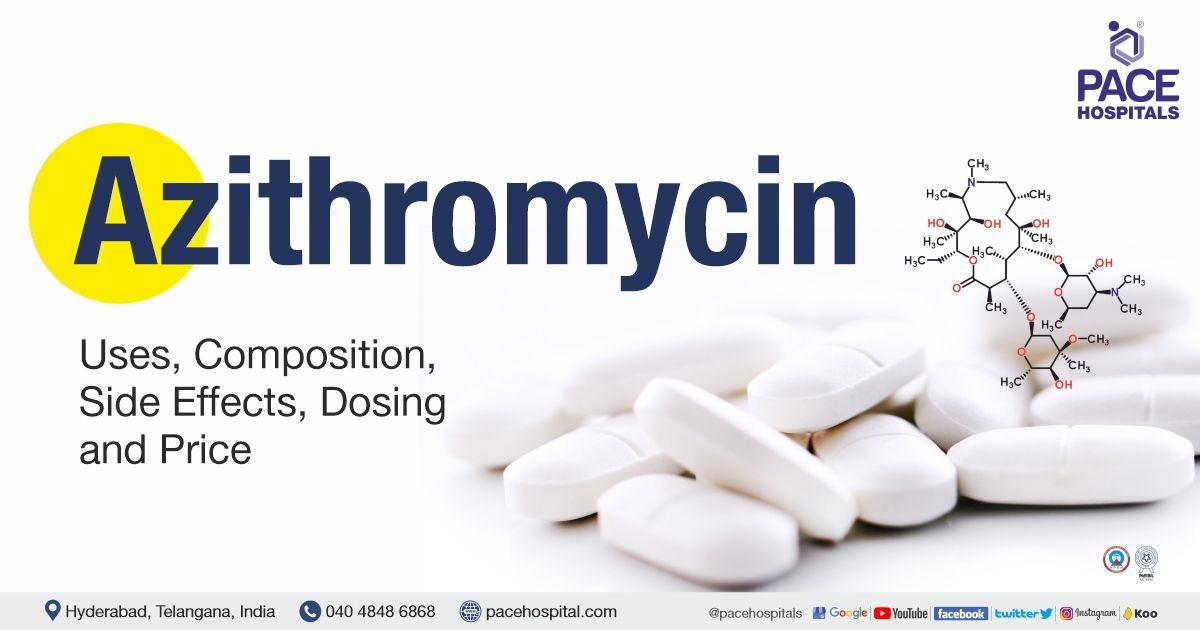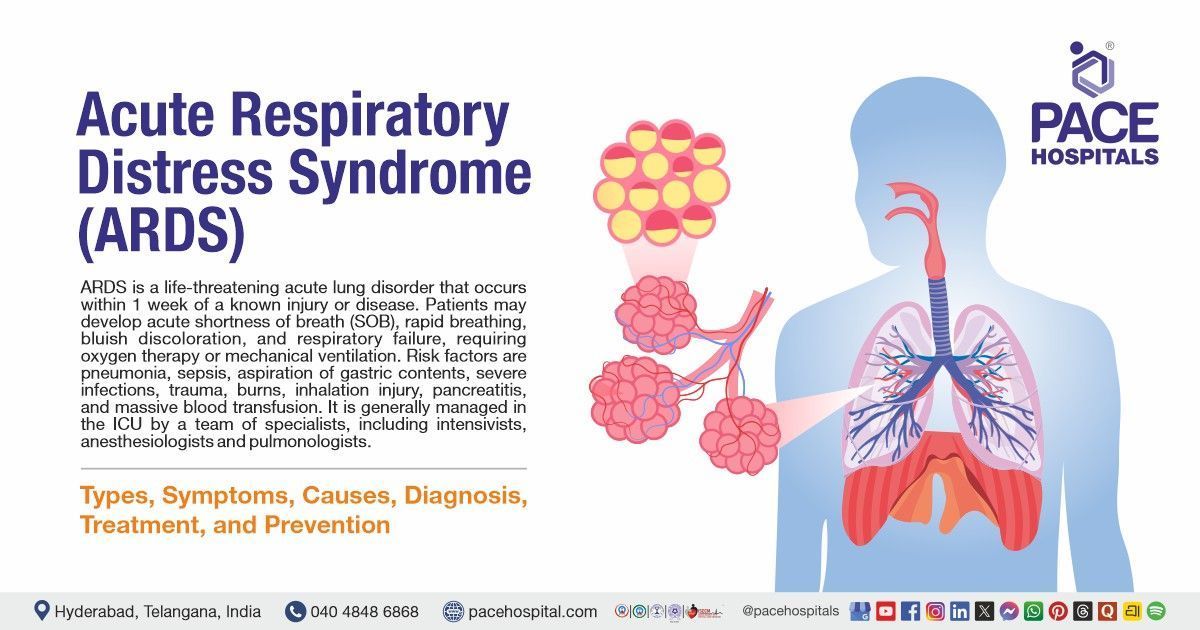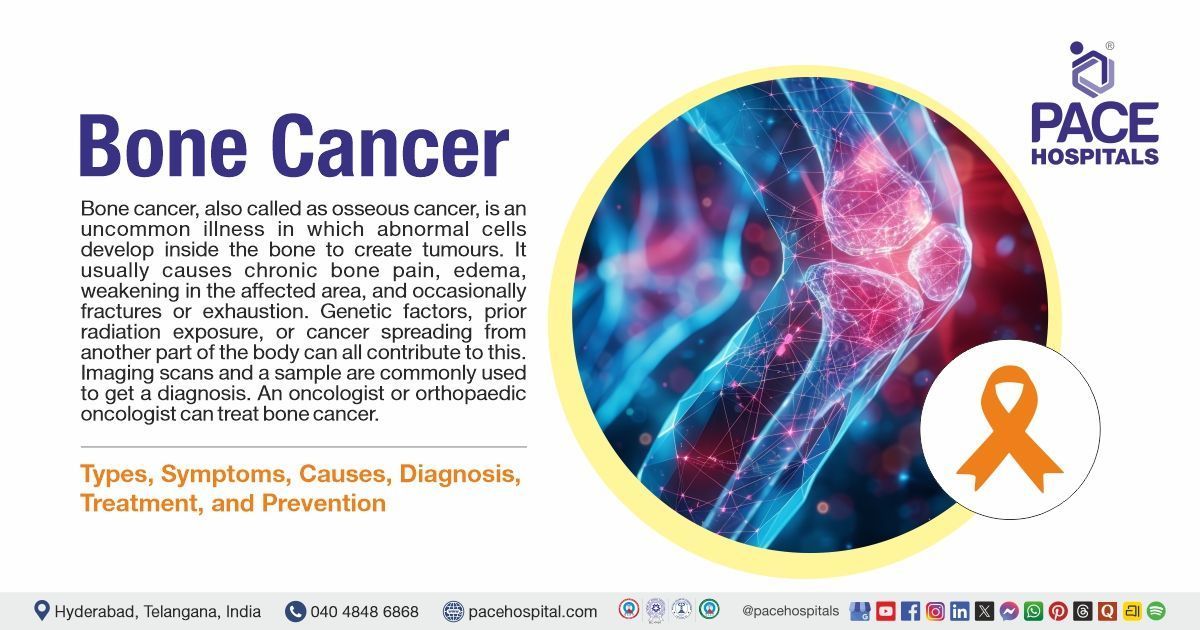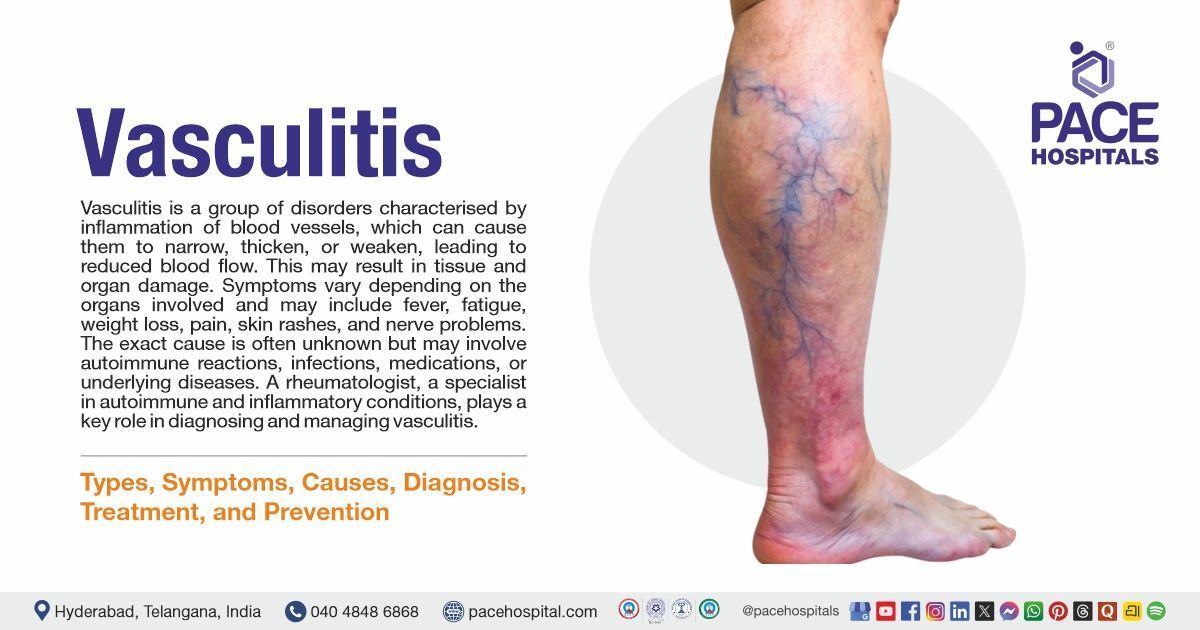Azithromycin - Uses, Side Effects, Composition, Dosage & Price
PACE Hospitals
Overview of Azithromycin
Azithromycin is a macrolide (class of antibiotic) antibiotic used to treat various bacterial infections such as respiratory tract infections, skin infections, ear infections, throat infections, sexually transmitted diseases, lung infections, pneumonia, sinuses and bronchitis .
- It is derived from another macrolide antibiotic erythromycin.
- It was discovered in 1980 and patented by Pliva pharmaceutical company in 1981.
- It is obtainable in generic form, the available forms of azithromycin are capsules, tablets, intravenous injections, oral suspensions, sachets and ophthalmic solutions.
Azithromycin tablet uses
Azithromycin is a widely used broad spectrum antibiotic, which is majorly preferred for mild and moderate bacterial infections. Azithromycin is globally used for the numerous infections of the upper and lower respiratory tract, urogenital, stomach, reproductive organs, throat, ears, eyes, sinuses, and lungs.
Azithromycin plays a key role against various microorganisms such as Mycoplasma, Chlamydia, Neisseria, Staphylococcus and Streptococcus species.
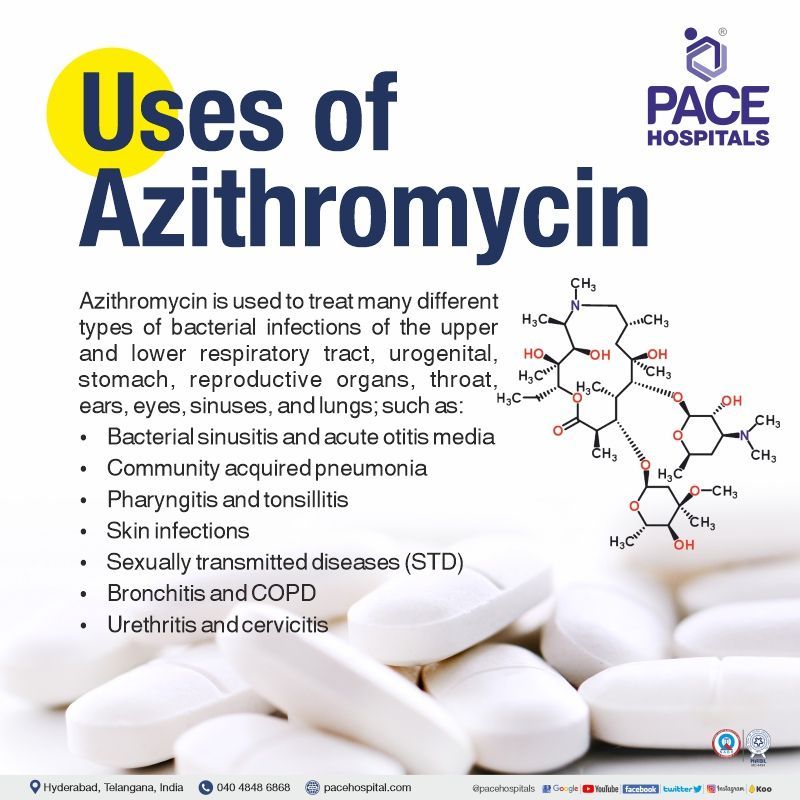
Guidelines to follow while taking Azithromycin
- The safest dose of azithromycin is 5 mg/kg and the maximum daily dose is 2000 mg/day (in case of severe infections).
- Usually, a single dose of 500 mg in a day or else 250 mg twice in a day is prescribed by the physician, higher doses are recommended based on severity.
- Take it in regular time intervals daily to get a better result.
- Take it with a glass full of water.
- Take azithromycin at least 1 hour before or 2 hours after food.
- Maintain at least two-hour time gap between azithromycin and indigestion tablets.
- Do not take 2 doses at the same time as it leads to adverse events - In case of a missed dose (due to forgetfulness etc.) the next dose must be taken immediately as and when it is remembered but if it is close to the next dosing schedule, skip it and go for the next dose.
- In case of any side effects occurrence, such as vomiting or loose motions, the physician must be immediately contacted to follow the necessary remedies.
- Follow the treatment schedule as directed by the physician.
Azithromycin mechanism of action
Protein synthesis is the common feature seen in the majority of all the living beings. It is through protein synthesis the bacteria can continue its growth, reproduction, fundamental metabolic functions, and repair. Transcription and translation are the two phases involved in protein synthesis. Ribosomes are the components present in cell necessary for protein synthesis.
Azithromycin works by prohibiting the attachment of 50s ribosomal unit in the bacteria thus preventing translation of mRNA, thereby disrupting the protein synthesis and bacterial growth.
Azithromycin indications
Azithromycin is indicated to treat:
- Bacterial sinusitis and acute otitis media (ear and sinus infections) caused by Haemophilus influenzae.
- Community acquired pneumonia (infection that inflames air sacs) caused by Mycobacterium and Staphylococcus pneumoniae.
- Pharyngitis and tonsillitis(infection of two oval-shaped pads back of the throat)caused by Streptococcus pyogenes.
- Skin infections caused by Staphylococcus aureus and Streptococcus pyogenes.
- Sexually transmitted diseases caused by Neisseria gonorrhoeae and Trachomatis.
- Bronchitis (inflammation of lining of bronchioles) and (COPD) chronic obstructive pulmonary disease [disease that block airflow] caused by Haemophilus influenzae.
- Urethritis (inflammation of urethra) and cervicitis (inflammation of cervix) caused by Neisseria gonorrhoeae and Trachomatis.
- Helicobacter pylori infection and gastrointestinal infections caused by H.pylori.
- Azithromycin is also prescribed in some combinational therapy to treat some infections.
- Azithromycin + artesumate (malarial drug) given in malaria treatment.
- Azithromycin + levofloxacin(antibiotic) given in lung infections.
- Azithromycin + doxycycline (antibiotic) given in sexually transmitted diseases.
Azithromycin dosage
Following below are the Dosage Forms & Strengths of azithromycin:
- 500 mg/vial (powder for reconstitution)
- 250 mg (tablet)
- 500 mg (tablet)
- 100 mg/5mL (oral suspension)
- 200 mg/5mL (oral suspension)
Azithromycin 500 dosage for adults
- Azithromycin for pneumonia: 500 mg given orally once on the first day, and then followed by 250 mg orally once from day-2 to day-5.
- Azithromycin for pharyngitis: 500 mg given orally once on the first day, and then followed by 250 mg orally once from day-2 to day-5.
- Azithromycin for tonsillitis: 500 mg given orally once on the first day, and then followed by 250 mg orally once from day-2 to day-5.
- Azithromycin for skin infection: 500 mg given orally once on first day, and then followed by 250 mg orally once from day-2 to day-5.
- Azithromycin prophylaxis COPD (chronic obstructive pulmonary disease) dose: 500 mg given orally once on first day and then followed by 250 mg orally once from day-2 to day-5.
- Azithromycin for sinusitis: 500 mg given orally once in a day for 3 days.
- Azithromycin for chancroid (sores on genitals): 1000 mg given orally at once.
- Azithromycin dosage for urethritis: 1000 mg given orally at once.
- Azithromycin dosage for cervicitis: 1000 mg given orally at once.
Azithromycin pediatric dose
Azithromycin for otitis media:
- < 6 months: safety and effectiveness were not proved.
- ≥ 6 months: 30 mg/kg given once orally or 10 mg/kg given once orally in a day for 3 days.
Azithromycin for pneumonia in paediatrics:
- < 6 months: safety and effectiveness were not proved.
- ≥ 6 months: 10 mg/kg given once on first day followed by 5 mg/kg orally once from day-2 to day-5.
Azithromycin for tonsillitis in paediatrics:
- < 2 years: safety and effectiveness were not proved.
- ≥ 2 years: 12 mg/kg given once orally for 5 days.
Azithromycin for pharyngitis in paediatrics:
- < 2 years: safety and effectiveness were not proved.
- ≥ 2 years: 12 mg/kg given once orally for 5 days.
Azithromycin dose in children for cervicitis and urethritis:
- ≥ 45 kg: 1gram single dose is given orally once
Azithromycin for COVID-19
As azithromycin is a macrolide antibiotic it has a various range of properties like antibacterial (reduces bacterial growth), anti-inflammatory (reduces inflammation) and anti-viral effects (inhibits or destroys the viral growth). Previously it has been used to treat various viruses related to MERS-CoV (Middle East respiratory syndrome) due to its abundant nature of availability, low cost, and as well as safer drug.
Invitro (test done in laboratory) azithromycin study stated that azithromycin has broad spectrum activity regarding EBOLA, SARS COV, SARS COV-2, ZIKA and ENTERO viruses. Studies has proven that azithromycin in combination with hydroxychloroquine decreases the viral load in humans.
Dose dependent, azithromycin activates and stimulates the interleukin pathways and thereby promotes the anti-inflammatory effect.
Studies concluded that azithromycin shows best results in early stages of covid (mild and moderate) but it is not suggested for severe respiratory failure, and it doesn’t reduce the stay in hospital, furtherly it is not used as standard drug in covid.
Azithromycin dose for COVID-19
- Azithromycin is recommended for 14 days in the early covid with patients not having any other serious comorbidities.
- The suggested dose of azithromycin for covid is 500 mg, given once daily for 14 days.
Note: The dosing information (doses, dosages frequency, and everything connected) provided here is compiled from accurate trusted sources. Nevertheless, we neither cannot guarantee its accuracy nor shall be responsible for any of its update. We do not encourage self-medication. The treating physician retains the medical discretion of administering or discontinuing the drug.
Azithromycin side effects
Azithromycin common side effects:
- Fatigue (feeling sick)
- Nausea (sensation of vomiting)
- Diarrhoea (loose watery stools)
- Impaired sense of taste
- Headache
- Loss of appetite
- Dizziness (light headedness)
Serious side effects of azithromycin:
- Arrhythmia (irregular heart beat)
- Tinnitus (ringing in the ear)
- Vertigo (feeling imbalance on your feet)
- Pancreatitis (inflammation of the pancreas)
- Severe watery diarrhoea (loose stools)
Note: If you experience any serious side effects as mentioned above or else with any serious reaction then immediately seek medical attention by visiting to the hospital or physician.
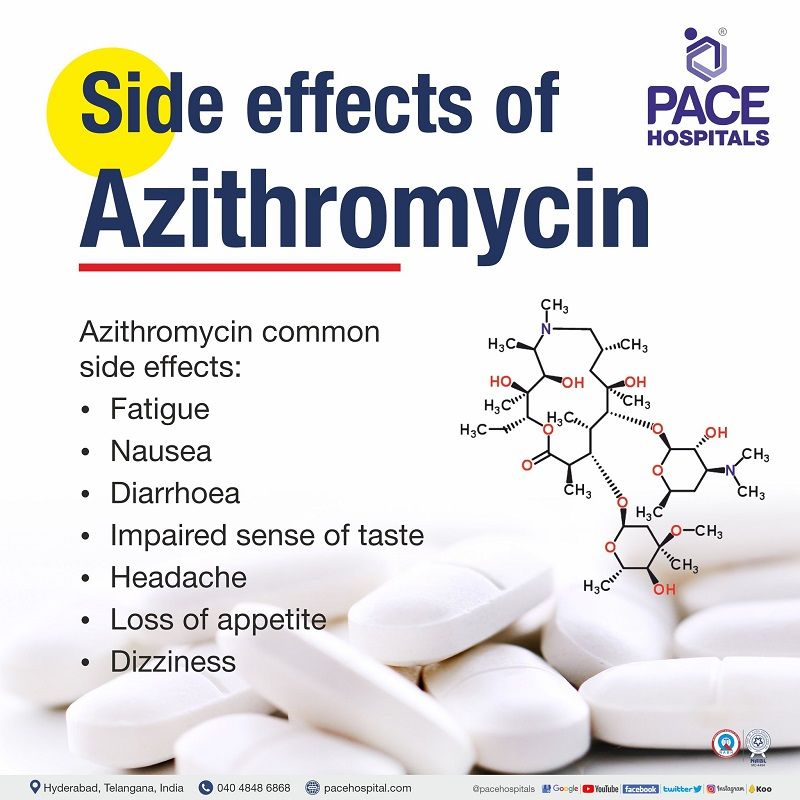
Side effects of azithromycin on specific organs/systems
- Respiratory system: Azithromycin may induce bronchospasm and cough.
- Gastrointestinal system: Azithromycin may cause vomiting, abdominal pain, and loose stools.
- Cardiovascular: Patient may experience chest pain, and palpitations (feeling of fast beating of heart)
- Skin: In rare conditions, patient may experience anaphylactic reaction (adverse) such as rashes and hives
- Renal (kidney): Azithromycin may cause nephritis (inflammation of nephron) in renal patients
Azithromycin contraindications
Azithromycin is contraindicated in patients who are allergic / hypersensitive to it.
Azithromycin is contraindicated in patients who are using primary anti-depressant drug pimozide, which in turn leads to dangerous plasma levels of pimozide and causes severe arrhythmias.
Azithromycin is also contraindicated in patients who had past history of cholestatic jaundice or hepatic dysfunction prior to administration.
Effect of azithromycin in pregnancy, breastfeeding, and fertility
Azithromycin in pregnancy:
- Studies has stated that azithromycin is safe to use in pregnancy. Nevertheless, a medical consultation is necessary before this medicine can be taken by carrying mothers.
Azithromycin during breastfeeding:
- No proofs have shown negative effects of azithromycin to the baby during breastfeeding, consult your physician if any side effects are seen.
Azithromycin effect on fertility:
- There are no proofs that azithromycin effects the fertility.
Azithromycin interactions
A drug interaction is a reaction between two or more drugs or food, or supplements which leads to the undesired reaction.
A wide range of effects could be expected when azithromycin is given in combination with the following drugs:
- colchicine (gout medication): increases the plasma levels of colchicine and leads to multi organ damage.
- pimozide (anti-depressant): leads to irregular heartbeats.
- digoxin (cardio drug-anti arrhythmic): alters the intestinal flora.
- antacids (drug for acidity): decreases the levels of azithromycin
Note: On discussion with your physician, he/she may advise you to avoid or take an alternative drug or maintain time gap if any of the above prescribed drugs are to be taken together.
Azithromycin price in India
Maximum retail price of Azithromycin 500 mg as per year 2023:
- Azithral 500 Tablet: ₹ 131.94 for one strip (5 tablets in each strip) | Manufacturer/ Marketer - Alembic Pharmaceuticals Ltd
- Azee 500 Tablet: ₹ 131.93 for one strip (5 tablets in each strip) | Manufacturer/ Marketer - Cipla Limited
- Aziwok 500 Tablet: ₹ 131.90 for one strip (5 tablets in each strip) | Manufacturer/ Marketer - Dr Reddy's Laboratories Ltd
- Azimax 500 Tablet: ₹ 119.50 for one strip (5 tablets in each strip) | Manufacturer/ Marketer - Cipla Ltd
- Zady 500 Tablet: ₹ 117.71 for one strip (5 tablets in each strip) | Manufacturer/ Marketer - Mankind Pharma Ltd
- Laz 500 Tablet: ₹ 114.30 for one strip (5 tablets in each strip) | Manufacturer/ Marketer - Hetero Drugs Ltd
- Azibact 500 Tablet: ₹ 131.93 for one strip (5 tablets in each strip) | Manufacturer/ Marketer - Ipca Laboratories Ltd
- Zithrocin 500 Tablet: ₹ 70.62 for one strip (3 tablets in each strip) | Manufacturer/ Marketer - Zydus Healthcare Limited
- Azibest 500 Tablet: ₹ 63 for one strip (3 tablets in each strip) | Manufacturer/ Marketer - Blue Cross Laboratories Ltd
- Azilide 500 Tablet: ₹ 117.71 for one strip (5 tablets in each strip) | Manufacturer/ Marketer - Micro Labs Ltd
- Azipro 500 Tablet: ₹ 71.50 for one strip (3 tablets in each strip) | Manufacturer/ Marketer - Cipla Ltd
- Azitus 500 Tablet: ₹ 64.50 for one strip (3 tablets in each strip) | Manufacturer/ Marketer - Zuventus HealthCare Ltd
- Zithromax 500 Tablet: ₹ 41.55 for one strip (2 tablets in each strip) | Manufacturer/ Marketer - Stanford Biotech Pvt Ltd
- Trulimax 500 Tablet: ₹ 74.11 for one strip (3 tablets in each strip) | Manufacturer/ Marketer - Pfizer Ltd
- Azivista 500 Tablet: ₹ 119.50 for one strip (5 tablets in each strip) | Manufacturer/ Marketer - Cadila Pharmaceuticals Limited
- Azikem 500 Tablet: ₹ 71.50 for one strip (3 tablets in each strip) | Manufacturer/ Marketer - Abbott Healthcare Pvt Ltd
- Azicip 500 Tablet: ₹ 79 for one strip (3 tablets in each strip) | Manufacturer/ Marketer - Cipla Ltd
Frequently Asked Questions (FAQs) on Azithromycin
Share on
Request an appointment
Fill in the appointment form or call us instantly to book a confirmed appointment with our super specialist at 04048486868

